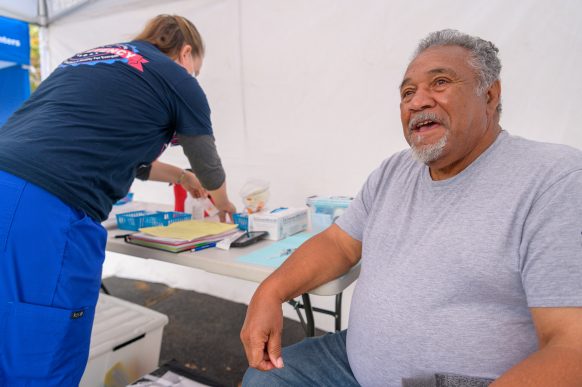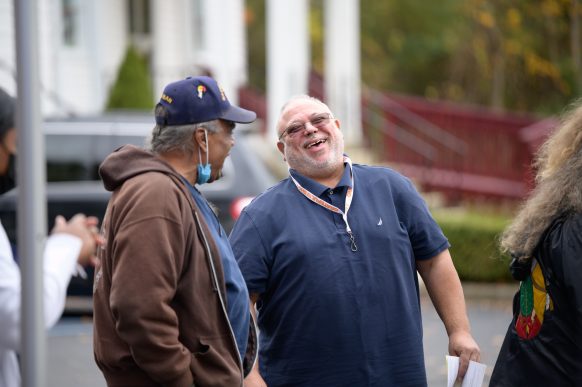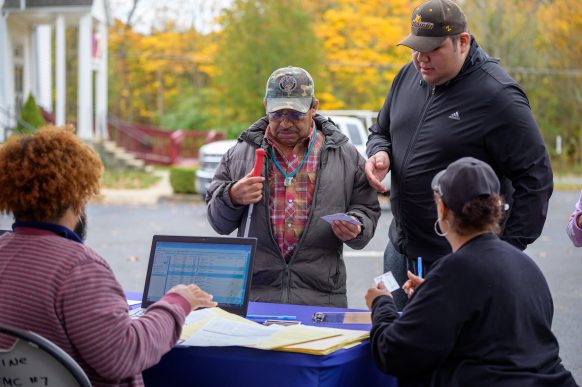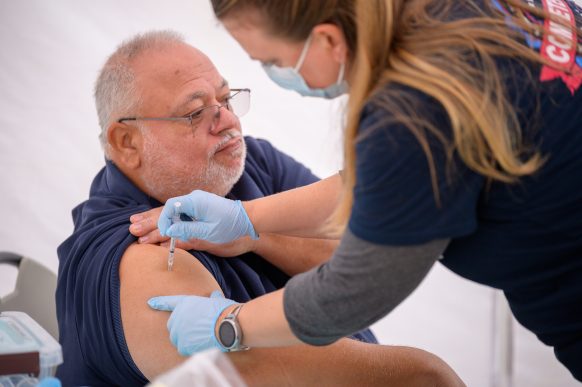November is Native American Heritage Month, and now more than ever we want to recognize our American Indian Tribes all around New Jersey, especially in their time of need. This year, there has been a major vaccine initiative in the Nanticoke Lenni-Lenape Tribe, the largest American Indian Tribe in New Jersey. The Covid pandemic was particularly hard on this community, and a lack of access to good health care, including vaccines, has been a detrimental issue that needed to change.
Leading the charge is Gail Gould, wife of the Tribal Chairperson, the new Chair of Committee on Native American Ministries (CoNAM), and the New Jersey State American Indian Covid Coordinator under the New Jersey Commission on American Indian Affairs. To say she wears many hats is an understatement.
The New Jersey Commission on American Indian Affairs received a grant of $580,000 through the Department of Health to provide Covid-19 services to New Jersey’s three State-recognized tribes and inter-tribal communities. This is to ensure they have vaccines, clinics, and PPE in the area, especially for vulnerable populations. This is a three-year grant that started in 2021, but Covid was so prevalent that officials weren’t in the office every day, so it took a while to establish the clinics, but now there are approximately 150 clinics throughout New Jersey.
The United Methodist Church is a major partner, having provided a safe and supportive environment for Native Americans for decades. St. John’s United Methodist Church has partnered with South Jersey Family Medical Centers to spearhead a rural health initiative, which actually began in the U.S. almost 50 years ago. Their mission is to provide high-quality, culturally-sensitive care to all people of any race, culture, creed, or economic status. SJFMC started in 1977 with just seven employees and today have grown to about 250 employees.
The need for good health care has grown exponentially with the Covid-19 pandemic. Stunning news has recently been published from the CDC that the life expectancy for Native Americans has dropped by over seven years. Health problems are related to historical poverty and lack of health care, but the pandemic exacerbated the issue and is essentially to blame for an astounding number of deaths in the Native American community over the past three years. Underlying health conditions, such as obesity and diabetes, put citizens at greater risk of dying from Covid, but the lack of access to health care has also made a huge impact. Not only must they travel a long way to access health care, but they are also met with hurdles like discrimination from doctors and sometimes a language barrier that make it tougher to get the care they need. This is one of the fundamental reasons for this initiative. If they couldn’t get to the vaccines, the commission wanted to bring vaccines to them.
Now that the majority of people in the Native American community have been vaccinated, they are opening it up to the rest of the communities, putting the rest of the grant money to good use. As Gail Gould suggested, “What is the point of having our community vaccinated if the people we interact with are not?” They have opened the vaccinations sites to everyone and have even been holding them in parking lots downtown to reach some of the homeless and immigrant population.
Cynthia Mosley is the “boots on the ground” person who is setting up the vaccine clinics and recruiting the participants. Gould shared, “Cindy and I have a passion for helping not only Native Americans but all people.” Gail’s name is quite fitting, as it means “gentle leaves.” She says, “the limbs of the trees protect all,” and that is exactly what she intends to do. Not only to they provide vaccines, but they also provide much through the church food bank, including meals, produce, baked goods, clothing, household goods, diapers (for babies and adults), baby formula, wipes, hygiene products, and other essentials to families in need. During Covid, they serviced 450 families, and now they are at 400, including Ukrainian refugee families. They recently purchased 60 winter coats, 60 queen-sized blankets, hats and gloves, snow suits for children, and boots, distributing them to families at the end of October. They are also working with the Cook Native American Ministries Foundation for the Winter Gear and Tool Closet Program. They have a tool shed for snow shovels, windshield scrapers, and other seasonal equipment to help people get through winter storms.
They also provide lunches for elders, as well as lunches and dinners for children during the Summer Feeding Program. They offer approximately 90 meals a day in the summer and give out elder boxes so seniors don’t have to trek all the way to the supermarket which can be miles away.
Overall, they are doing so much good for the community in every way possible. As Cynthia shared with us, they are more than just a church; they provide social services to the community. She says, “Scripture tells us to do that, and that’s what we do.”
The most important message she shared is “We are still here.” Our Native American brothers and sisters do not want to be forgotten. GNJUMC has had a supportive hand in making sure Native Americans in New Jersey are still seen and taken care of, especially in rural areas where they are most in need. This month, as we celebrate Native American Heritage, may we all remember that taking care of each other is always the right thing to do.




